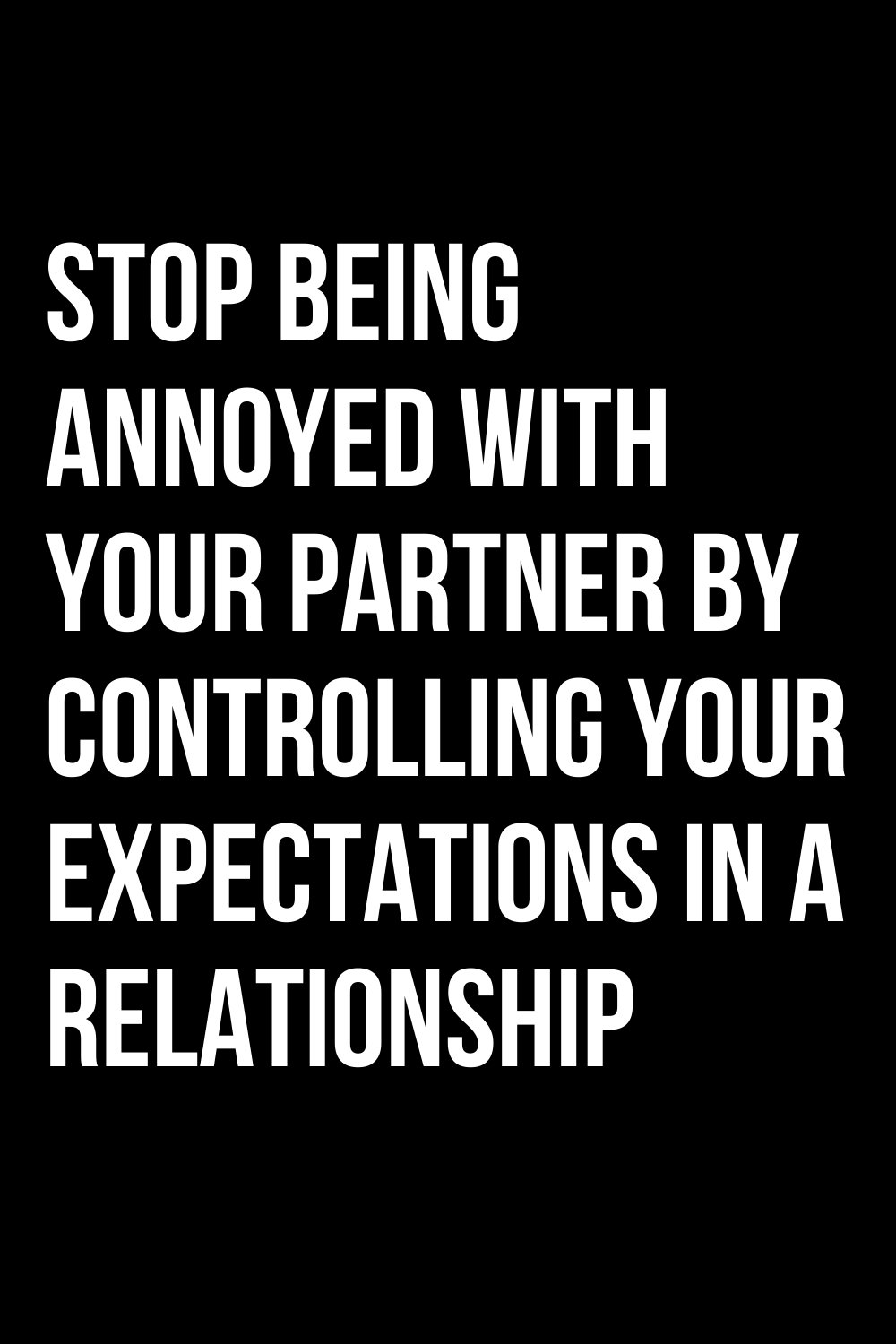STOP BEING ANNOYED WITH YOUR PARTNER BY CONTROLLING YOUR EXPECTATIONS IN A RELATIONSHIP

Stop Being Annoyed With Your Partner By Controlling Your Expectations In A Relationship
Having expectations of your partner is good and can even be healthy. But having unrealistic expectations and getting angry when your own expectations don’t match those of your partner is a whole different matter. This is an area that we all want to avoid. If you want to stop fretting about your partner, controlling expectations is the only way to go.
When something isn’t great or just mediocre, most of us want to do our best to make it better – especially in a relationship or marriage. In fact, we usually want to make sure that our romantic relationships last and get better over time.
I have a little secret for you: even if we keep improving our relationships, without realistic handling of the expectations in a relationship, you could break free of getting angry and loving less and more.
As a coach, I often help my clients develop and manage healthy relationship expectations in order to improve the chances of a long-term relationship. And while there are many things you can do together to make your love stronger, there are also some things you can do alone!
Managing expectations in relationships by changing your thoughts
The way we think about our relationship and our partner can have a huge impact on how we experience our relationship. Therefore it is important to reflect on our thought patterns about our partner and our partnership and possibly change them.
For example, when we are deep in a relationship, it is not uncommon for us to have critical thoughts about our partner. We may think our partner is selfish or doesn’t care about us. We may feel that our partner has gotten bored or that they are not doing the housekeeping enough.
And while these things can be perfectly right, of course, sometimes our thought patterns about these behaviors are a bigger reason our relationship suffers – and this is where expectation management becomes critical.
The more you are able to change the way you think about your relationship – from something negative to something positive – the greater the chances that you and your partner will be happy in a relationship and that your relationship will grow stronger.
One way you can go about this is by doing the following exercises.
Before you start the exercise, however, I would like to emphasize that there are problems in every relationship (even the couple in love who still post about the other on Facebook have some!).
And when you’re having great difficulty, the solution doesn’t necessarily lie in changing the way you think about the problem. After all, it’s a trail that has been found to be useful – to see if you want to take it.
An exercise to stop being annoyed with your partner
When our partner does something wrong – for example, on their way to work forgets to take out the trash (as promised) – our brain automatically tries to understand why our partner didn’t do what they said.
According to relationship researcher Eli J. Finkel, the understanding of the brain can be divided into these two categories:
- Temporary / stable
- Inherent Qualities / External Qualities
The Temporary / Stable category is about how we perceive our partner’s behavior from a temporal perspective.
If we look at our partner’s behavior from a temporal perspective, we consider our partner’s failure to take out the trash to be a coincidence. If we consider our partner’s behavior to be “stable”, we see it as a “classic” for our partner. It is typical for our partner not to take out the garbage.
The Inherent Properties / External Properties category is about what we attribute to behavior.
When we think that our partner didn’t take out the garbage because, for example, he easily gets tunnel vision in the morning when there is so much to do. Then the behavior is part of the innate quality of our partner.
But if we think that our partner left the garbage behind because the fire alarm went off and he had to get out quickly – well, then it is about an external factor that our partner could not control.
How these categories are meant for one another
You see that the same behavior when we look at it in different ways, can either increase or decrease the anger – which shows how much the change has changed ours
- Thoughts can be.
- How these categories work together
The above factors can interact in a number of ways. We can explain their behavior as follows, for example:
Temporary and Inner Qualities: My partner left the trash because he is sick at the moment.
Or stable and inner qualities: my partner never pays attention to what I want when doing housework.
The above examples make it clear how our thoughts about a particular situation affect our mood. And that dealing with expectations in a relationship is not about lowering them, but rather about seeing our partner differently.
It’s not about our partner not having annoying traits, because let’s be honest – we all have them. But this exercise can help us when we are constantly angry about everything our partner does!
One thing to keep in mind with this exercise is that we will likely never know exactly why our partners will behave the way they do in every situation (even if we ask them!). And maybe it is not at all desirable to always understand – at least if we want to maintain the relationship we have with him or her!
For this reason and so that we both feel comfortable in our relationship, it can make sense to give preference to our partner when in doubt.
To come back to the example of garbage disposal …
Instead of thinking that our partner hasn’t forgotten the garbage, but simply didn’t bother to get it out because it’s selfish (analysis based on the combination of stable and inherent traits), we can instead think, that our partner had a lot to do this morning. That our partner just didn’t have time (analysis based on temporary, external characteristics).
If we think this way, we increase the happiness in a relationship and with it the longevity. Now, take a minute to think about something your partner did today or last week that upset or upset you.
- How does your partner’s behavior make you feel when you look at the different categories: temporary/permanent and internal/external qualities?
- Using these categories, are you ready to work on your thoughts and see what happens over the course of a day or a week?
- If not – how come?
- If so, what is the best way to remember to use this exercise throughout your day or week?
An exercise to idealize our partner
A really interesting and contradicting way of dealing with expectations in relationships has to do with idealizing our partner. As crazy as that sounds, I think you will be able to get rid of it!
Researcher Sandra Murray found that those who idealize some traits in their partner have a better chance of lasting relationships.
Idealizing our partner’s traits has not only proven effective in one particular situation, but it also has a positive effect on how we perceive our partner’s less attractive traits.
For example, idealizing our partner’s ability to always take care of others can mitigate the way we think about our partner’s less lovable traits. For example, that he never thinks about Valentine’s Day or forgets to give our children their vitamins in the morning.
Another way to do this exercise is to apply it to the positive things our partner is doing. If we imagine that the positive aspects – like baking a cake for us on Sunday – depend on internal and stable characteristics (our partner is a nice and caring person), this behavior becomes even more positive for us.
In comparison, we think cake baking is only due to our partner having more time (a temporary and external trait). Then the cake tastes half as good in your mouth.
Take a minute to think about your partner:
- What are its most attractive features?
- What are the things your partner does that you appreciate? Try to think of something very common. For example, baking a cake.
- What if you try to idealize one of these everyday things?
- How do you feel about your partner now?
You may not feel much of a change after doing this exercise – but maybe you do. The trick is, hold on and notice the changes over time!
Long-lasting love
When it comes to building a relationship that will last, the goal is not to remove all annoyances. We are all human and most relationships are conflictual.
But if you want to make your relationship even better and feel less angry, it can really help to work on things like managing expectations in relationships.
Next time you find yourself upset because your partner left the trash behind (despite promising not to) – stop. And try to think differently. If you change the way you view your partner, you may find that you have more butterflies in your stomach and less anger.






